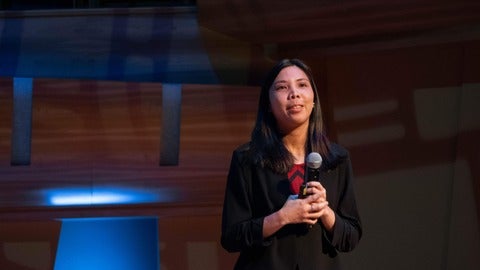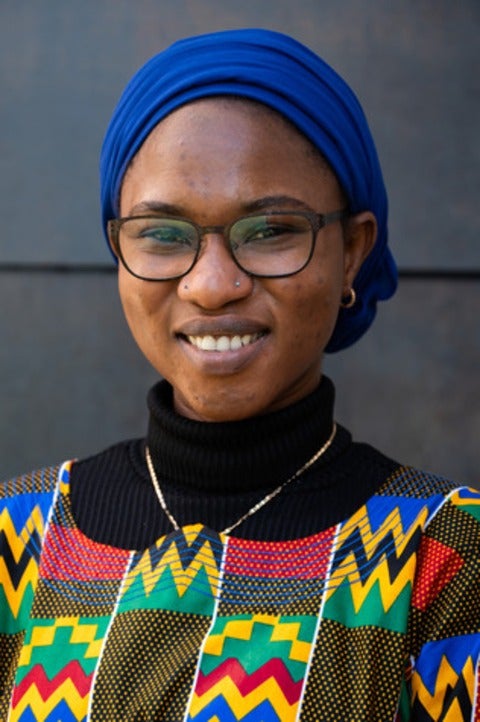Turbulent times like ours call for people who understand systems of violence and conflict, and who are prepared to build peace with justice. This involves identifying and transforming systems of violence, marginalization and oppression, including racist, gendered and colonial violence at home as well as around the world. Whether working locally or globally, Peace and Conflict Studies is committed to imagining, educating and ongoing learning that equips our graduates to pursue justice and peace.
PACS as a department is located on territory that is governed by the Dish with One Spoon Wampum and land promised to the Six Nations Confederacy in 1784 as part of the Haldimand Declaration. For more information, see Conrad Grebel University College's land acknowledgement and read about decolonization at the University of Waterloo's Office of Indigenous Relations.
A Vibrant, Interdisciplinary Graduate Program
The Master of Peace and Conflict Studies (MPACS) program is a coursework-based, professional degree that empowers students with knowledge and skills to contribute to nonviolent peacebuilding. Combining rigourous interdisciplinary scholarship with experiential learning opportunities, the program provides graduates with tools to understand sources of conflict, polarization, and systems of violence, as well as to imagine and initiate transformative peacebuilding. Our distinctive focus is on civil society and community-led change.
The master's degree is typically completed in 16 months (four terms), consisting of coursework, an optional internship placement, and practical skill development courses, with options for independent research. Part-time studies are also possible.
Understanding conflict
Recognizing conflict as an inescapable part of the human experience, and a potential vehicle for positive change at local, national, and international levels, this master’s degree offers a cutting-edge approach in which dynamic, sustainable, and creative solutions to conflict can be imagined, tested, and applied. Students learn with field-experienced faculty, developing their critical, analytical, and reflective thinking skills, and preparing to plan and implement effective programming, principled advocacy, and innovative peace initiatives.
Agents of peacebuilding
Equipped with interdisciplinary knowledge and practical skills of peacebuilding, MPACS graduates are ready for careers in the non-profit, public, or private sectors, as agents of peaceful change at community, institutional, and systematic levels. Common careers paths include: conflict management, community development, mediation and restorative justice, education, human rights work, research and advocacy, and social change entrepreneurs.
News
Fiona Li – Mapping Actionable Change
On May 27, Fiona Li earned the second-place prize at the Map the System Canada competition in Calgary, Alberta. As the winner of the University of Waterloo’s Map the System campus finals, Fiona’s achievement on the national stage not only brought awareness to the over-representation of Indigenous women in Canadian prisons, but it also highlighted how programs like Peace and Conflict Studies are crucial in furthering education on how to research, understand, and present these critical issues.
Experiencing Both Sides of Mentorship – Melody Christa Chen (MPACS 2014)
Melody Chen is an Assistant Director of the Legal Industry Division at the Ministry of Law in Singapore. After graduating with a Master of Peace and Conflict Studies degree from Conrad Grebel University College in 2014, Melody completed law school and was admitted to the Singapore Bar as an Advocate & Solicitor of the Supreme Court of Singapore. In her free time, she loves honing her culinary skills in the kitchen, an interest she developed after bartering homemade lunches in exchange for rides to campus from fellow MPACS graduate, Ellen Sikorski.
Student Profile: Fatoumatta Camara – On Transitional Justice and Building Community
Prior to attending the University of Waterloo, MPACS student Fatoumatta Camara intended to pursue a career in diplomacy and international relations. However, The Gambia’s 2017 political impasse, during which half of the population was displaced, changed the trajectory of her career path. This experience sparked her desire to better understand why conflict turns violent, and to explore alternative methods of conflict resolution. In her search for a graduate program, she was drawn to MPACS because of its interdisciplinary approach and the many opportunities offered by the department.










